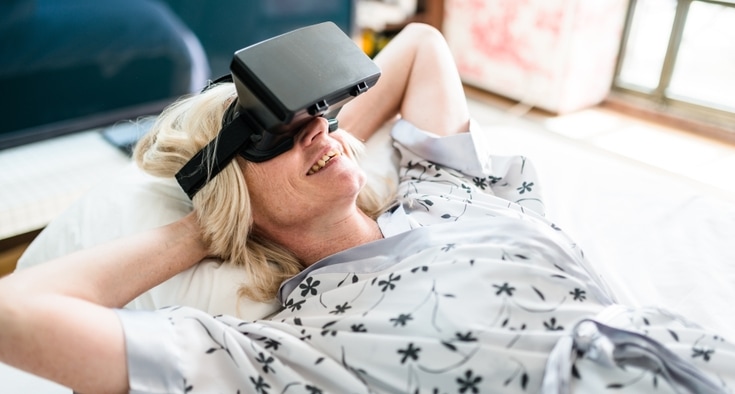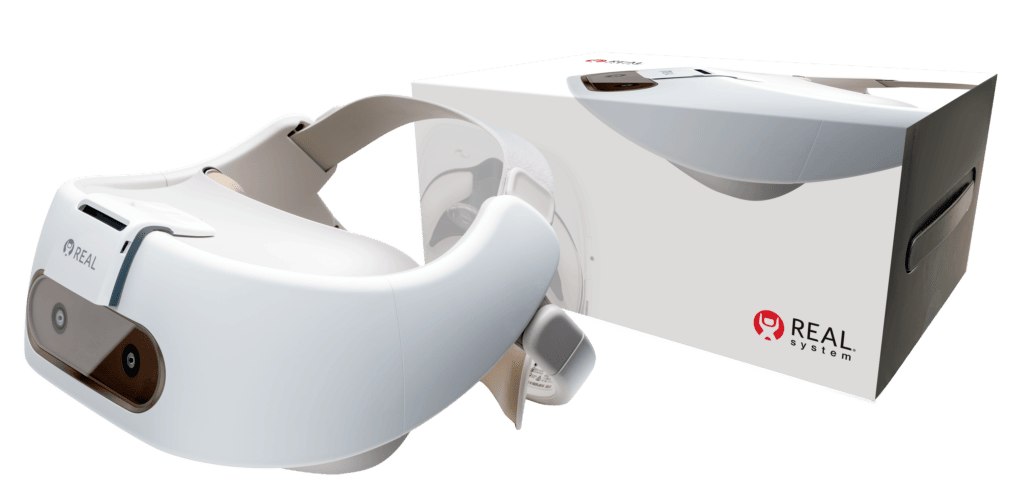Cancer survivor pays-it-forward with gift of virtual reality headsets

At the Novant Health Wallace Cancer Institute in Salisbury, patients using virtual reality headsets have a new way to help them through infusion treatments and diagnostic imaging. They don’t see the tubes, IV bags or monitor screens in their line of sight. Instead, they’re taking a VR excursion through an African safari, a scuba dive, tour of Paris or marveling at Italian sunsets.
And it’s all because one cancer survivor and her husband decided to pay-it-forward with a donation to ease the suffering of others in her community. No one knows better than Samantha Haspel how virtual reality can help distract patients and ease anxiety during treatments.
Haspel was a nurse and midwife dedicated to caring for patients who needed her. But in 2018, she found herself in the hospital fighting for her life.
“I was diagnosed on my 41st birthday with a massive tumor growing into my heart,” said Haspel, who lives is Salisbury. “It was not looking good for me.”
But Haspel hung on and her first two rounds of chemotherapy shrank the tumor. Her heart and pulmonary system began to recover. Her aggressive lymphoma required a year of treatment, including 10 rounds of chemotherapy, which failed to cure her. Haspel traveled to University of Pennsylvania where she received CAR-T cell immunotherapy, a treatment used when more conventional options have failed.
“With CAR-T immunotherapy, they reprogram your cells to target the cancer cells,” said Haspel, who also underwent 21 rounds of radiation therapy while waiting for her CAR-T cells to be manufactured. “Because the tumor was in my chest, I was strapped down with a mesh mask on my face during radiation, and it caused me a lot of anxiety.”
A pivotal moment that changed everything
While receiving radiation at in Pennsylvania, Haspel saw a virtual reality headset and TV monitor with directions, and a chair. Curious, she tried on the headset and found it instantly calming.
“Suddenly, my brain wasn’t thinking about my tumor and treatment – I was just sitting on a dock watching the sunset,” said Haspel. “The program put me in my happy place and became a real tool for me in my recovery.”
‘I’m not going anywhere’
In a romantic twist of fate, she’d recently begun dating the man who would become her husband, Robert Ring. In March of 2018 when Haspel learned she had cancer, they’d been dating for six months.

“I looked at him and said, ‘Listen, this is not what you signed up for. Tell me now and I will totally understand,’” said Haspel. “Rob looked at me and said, ‘I am not going anywhere.’“
Ring moved her into her mother’s house and the couple began planning their wedding. They were optimistic, but nervous about what would happen if the treatment didn’t work. “We covered life, death and everything in between,” Ring said.
In lieu of wedding gifts, the couple asked for donations to purchase a gift of their choice for the cancer center. The VR headset Haspel tried in Philadelphia had helped her so much, the couple decided to donate the technology to the Wallace Cancer Institute.
“My husband knows what it is like to feel totally helpless, and I know what it’s like to be on the table, sick and unsure how it will all play out, and you’re just wanting someone to hold your hand and talk to you,” said Haspel. “But in the absence of that, those VR headsets provided a way to escape the reality of cancer, even for a moment, to envision myself somewhere else.”
The gift of tech
In partnership with the Novant Health Innovation Lab, Haspel and Ring donated 25 Penumbra REAL i-Series virtual reality headsets to the Wallace Cancer Institute. The donation came via a gift to the Novant Health Rowan Medical Center Foundation.

“There is such a broad spectrum of emotions you feel while going through cancer, which is devastating enough,” said Haspel. “We wanted to give the VR headsets to people going through it, especially those who are alone without support networks.”
Located in the infusion center at Wallace Cancer Institute, headsets are available for patients in a variety of treatments, and for team members in respite rooms. The headsets feature more than 10 hours of content that range from mindfulness to distraction from treatment. Patients can customize activities.
During the donation process, Haspel and Ring provided feedback to Penumbra that included adding a feature that shows the passing of time, changes in sunsets and sunrises, and stars twinkling to make the program more interactive.
“I am really passionate about health care and health care access, but due to cancer, I was out for too many years to be back in a clinical setting,” said Haspel. “This is my way to get back in there and be a player in health care, without being at the bedside.”
When Haspel was diagnosed, they were living in High Point where she was working as a midwife. She left her job and Ring left his to take care of Haspel in Salisbury, where she had a support network in place. The couple would return home to find letters and flowers, soaps, hats, blankets, banana bread and a slew of other gifts. “That’s when I knew we were in the right place. There are so many random acts of kindness here,” said Ring.
Ring and Haspel are excited about what their donation will mean to people who don’t have loved ones in the picture and how the headsets can help them.
“What we did is a great start, but I recall when we were at death’s door, discussing life and eternity, and all the things you talk about after you get through the anger and confusion and sadness, we wondered what we would leave behind,” said Haspel.
Added Ring, “What is that one thing that would be your legacy and give the community something that matters?”
Looking ahead
Rebecca H. Smith is the manager of radiation oncology at the Wallace Cancer Institute in Salisbury. “We can’t say enough how thankful we are to receive this donation,” she said.
She recalled one patient with no family and minimal support who used the headset. “This patient was very anxious about receiving tube feedings to get the nourishment he needed,” Smith said. “He just kept saying how wonderful it was and the following day, he was excited to put the headset on again.”
Haspel wants to keep going.
“I hope I am just getting started helping others with whatever little part I can do in our small town, and it goes back to finding your meaning and your lesson if you make it out to the other side,” she said. “I am changed by the experience and want to help as many people as possible with what I have been given.”